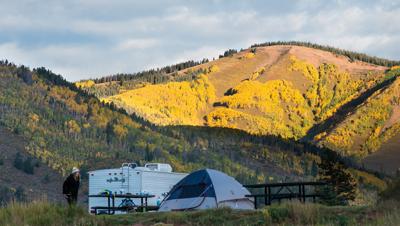On Thursday, Colorado Parks and Wildlife announced that they would be closing all campgrounds, camping and camping facilities (including yurts and cabins), and playgrounds at Colorado’s state parks and state wildlife areas effective immediately and until further notice. Closures in place at US Forest Service spots include campgrounds and trailheads.
This is a move that follows a statewide ‘stay-at-home’ order issued on Wednesday by Governor Jared Polis.
All campers currently on-site have been asked to vacate immediately. Reservation holders will be provided refunds or making other changes.
Some designated areas at the parks currently remain open, including trails, boat ramps, shorelines, and marinas. Additional spots where social distancing is difficult are being considered for closure, including fishing piers and picnic areas.
This closure order follow the closure of visitor centers and offices at state parks, days ago.
Some natural areas outside of the state park system have also been impacted in a big way, with the Manitou Incline and Rocky Mountain National Park closed due to virus concerns.
In addition to the state park closures, US Forest Service campgrounds, restrooms, trailheads, cabins and rentals, picnic areas, and trash facilities are closed. Check with your local National Forest, Bureau of Land Management, National Park Service, or US Fish and Wildlife Service office for additional information about the closures. This is also where you can find information about what recreational activities are allowed.
Restrooms at state parks currently remain open, but bring soap and hand sanitizer with you.
Outdoor activities such as walking, hiking, nordic skiing, snowshoeing, biking, and running are still allowed at state parks, and most other spots around the state.
If you are out on the local trails, avoid common areas such as bathrooms and parking lots for the purposes of social distancing. This may require additional planning or alternative modes of transportation. It’s also best if you stay in your hometown. Traveling to a trailhead could mean spreading undetected COVID-19 at pitstops you make along the way.
It is also advised that you stay out of the backcountry. By entering the backcountry, you risk adding to the workload of an already stretched search and rescue team, using resources that could otherwise be used to prevent the spread and treat the victims of COVID-19.
COVID-19 has infected more than 1,000 people in Colorado, killing 19. Read more about the breakdown of COVID-19 cases in Colorado here. Signs of illness include coughing, fever, and shortness of breath.
Sign up for our newsletter to get more updates on COVID-19 in Colorado.








(0) comments
Welcome to the discussion.
Log In
Keep it Clean. Please avoid obscene, vulgar, lewd, racist or sexually-oriented language.
PLEASE TURN OFF YOUR CAPS LOCK.
Don't Threaten. Threats of harming another person will not be tolerated.
Be Truthful. Don't knowingly lie about anyone or anything.
Be Nice. No racism, sexism or any sort of -ism that is degrading to another person.
Be Proactive. Use the 'Report' link on each comment to let us know of abusive posts.
Share with Us. We'd love to hear eyewitness accounts, the history behind an article.